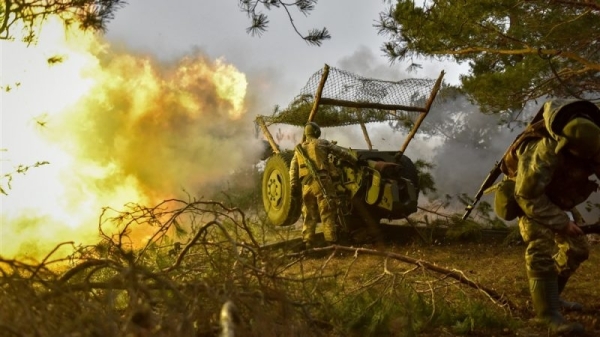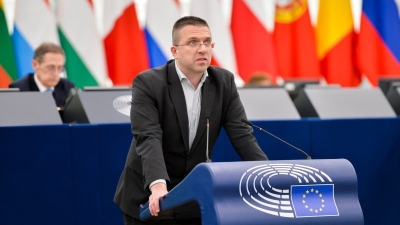EU proposes three-track approach to secure ammunition for Ukraine, support industry

In a bid to speed up the supply of ammunition to Ukraine, EU’s chief diplomat Josep Borrell is proposing to use an additional €1 billion to boost ammunition production in Europe, according to an options paper sent to member states, parts of which have been seen by EURACTIV.
Ukraine’s Western allies are scrambling to ramp up supplies of 155-millimetre shells as they warn Kyiv faces critical shortages in the face of a grinding Russian offensive.
Over the past weeks, senior EU officials have been stressing the matter should be “treated with utmost urgency” and “needs to be resolved in a matter of weeks”.
EU officials estimate that Ukrainian forces use up to 7,000 shells daily, with heavy attritional howitzer battles around Bakhmut, while Russia’s troops are firing around 50,000.
The EU options paper presented to the bloc’s ambassadors for discussion on Thursday (2 March) comes after a letter sent by Borrell to member states last week, drafted by the EU’s diplomatic service (EEAS), the European Commission and the European Defence Agency (EDA).
It suggests a three-track plan to address the shortfalls, boost ammunition production across the bloc and support the replenishment of member states’ own stocks.
“All three elements are crucial to sustaining our support for Ukraine moving forward,” the paper said. “All three tracks need to be pursued in parallel and as a matter of urgency.”

EU’s Borrell supports Estonia’s joint arms acquisition proposal
The EU’s chief diplomat Josep Borrell said on Sunday (19 February) he supported an Estonian proposal for the European Union to buy ammunition on behalf of its member states to provide more military support to Ukraine.
“I completely agree with the …
As a first step, it proposes using an additional €1 billion in joint funds to get member states to dig into their stockpiles, particularly 155-mm artillery shells, and provide them to Ukraine immediately.
The money would come from the bloc’s European Peace Facility (EPF), which has already dedicated €3.6 billion towards arming Ukraine since the start of the invasion last February.
In December, member states agreed to raise the financial ceiling of the intergovernmental fund by €2 billion in 2023.
The paper also suggests “a favourable reimbursement rate up to 90%, ” citing “the extreme urgency and the depletion of member states’ stocks.”
This comes after the EU’s arms fund has been struggling to cover the bulk of incoming reimbursement requests, especially from the largest donors in military support to Ukraine.
In a second step, the plan foresees member states to hash out an agreement for the joint purchase of 155mm ammunition by the bloc’s defence agency to sign the first contracts as early as next month “for a duration of seven years”.
According to the proposal, this would be a “massive order”, both to fill the gaps in national stocks and to ensure the supply of Ukraine in the long term.
EU officials and diplomats say such an approach would be more efficient than member states placing orders individually.
This would send the industry “a clear demand signal, enabling it to ramp up its production capacity in an orderly and enduring way across Europe”, the paper said.

EU arms fund faces reimbursement issues amid increased Ukrainian needs
*The article has been updated with further European Commission comments and clarifications on reimbursement.
The European Peace Facility (EPF), the EU’s off-budget fund to replace member states’ arms donations provided to Ukraine, is struggling to cover the bulk of incoming reimbursement …
A third track is intended to secure the long-term increase in European ammunition production and bolster production in their defence industries to help keep deliveries flowing further down the line.
Eventually, so the idea, the bloc could set up a specific fund to buy arms together for Ukraine if EU states agree to dedicate more financial means to it, the proposal said.
Asked for more details, the European Commission said “it is crucial to deliver more and faster where possible”.
“We can build on the work carried out by the European Defence Agency and the Defence Joint Procurement Task Force established last summer,” Nabila Massrali, EU foreign affairs spokesperson, told EURACTIV.
“The European Defence Agency has already been working on a project dedicated to joint procurement of ammunition,” she added.
The EU proposal is set to be discussed by EU defence ministers at their informal meeting next week (7-8 March) in Stockholm, with formal approval expected when EU foreign ministers meet in Brussels later this month (20 March).
EU leaders could then sign off on the plans in their regular summit on 23-24 March, according to EU diplomats.
The push comes after Borrell and Internal Market Commissioner Thierry Breton proposed joint ammunition purchasing in a mechanism akin to the one used during the COVID-19 pandemic to acquire vaccines jointly.
In a more serious push, Estonia earlier last month urged the EU to commit €4 billion to jointly purchase one million shells for Ukraine, calling on the bloc to pool resources to accelerate ammunition production and deliveries to Ukraine.
Estonia’s Prime Minister Kaja Kallas said at this year’s Munich Security Conference armaments makers had complained to her that they did not have large enough orders pending to justify scaling up their production.



